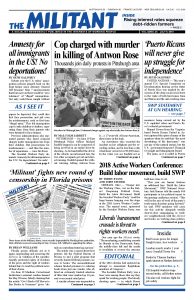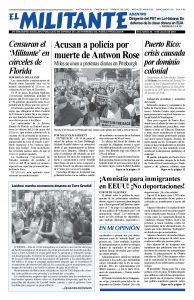July 12, 1993
On June 21 the U.S. Supreme Court upheld the Clinton administration’s policy of stopping in international waters Haitians fleeing military repression and forcibly returning them to Haiti without even permitting an asylum hearing.
“This is a crime,” said Max Pierre, an electronics engineer from Haiti who now lives in Miami. “How can you send people back to a place where whole families are being killed and there is no justice?”
Former U.S. president George Bush put the forced repatriation order into effect in May 1992. Bill Clinton, during his election campaign last year, denounced the interdictions as cruel and illegal. But he kept the policy in place when he became president, arguing in its defense before the Supreme Court in March.
Protests and political meetings within Haiti have also increased despite the constant threat of military repression.
July 12, 1968
BERKELEY, July 4 — Thousands of people are here in a jubilant celebration of the victory for freedom of speech and assembly won yesterday. It is a general assertion of the rights of citizens to meet together without fear of police attack.
On the same section of Telegraph [Avenue], just six days ago, police were using tear gas to break up a lawful, peaceful demonstration in support of the French students and workers.
It took a week of taking to the streets and of pressuring the city council to win the right to have Telegraph blocked off for today’s rally. And the city council hedged up until the last minute before giving in.
Yesterday, after 2,000 people gathered in the Civic Auditorium and pledged that they would hold their rally on Telegraph today regardless of what the council said, the city fathers granted their demands and voted to close off the street.
July 10, 1943
DETROIT — 1,800 delegates, representing 700,000 unionists at the sixth annual convention of the Michigan CIO answered the Smith-Connally “slave labor” Act by taking steps to launch an Independent Labor Party and by voting to request the national CIO junk the “no-strike” pledge.
CIO organization director Allan Haywood, John Brophy, head of Industrial Union Councils, and State CIO President August Scholle joined with the Stalinists in an attack against the resolution. But to no avail.
The convention passed the resolution “recommending to all of the affiliated unions and to the CIO that unless assurances that were made to labor are immediately and effectively put into operation, we consider our ‘no-strike’ pledge no longer binding and labor will settle the problems in the future in the only manner left open to it by the use of its economic strength.”

